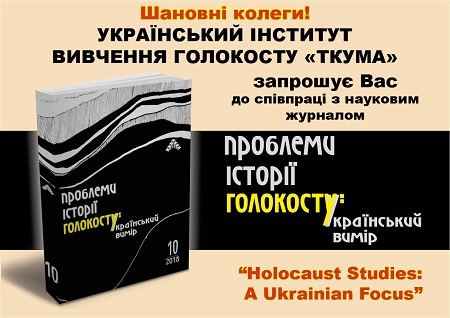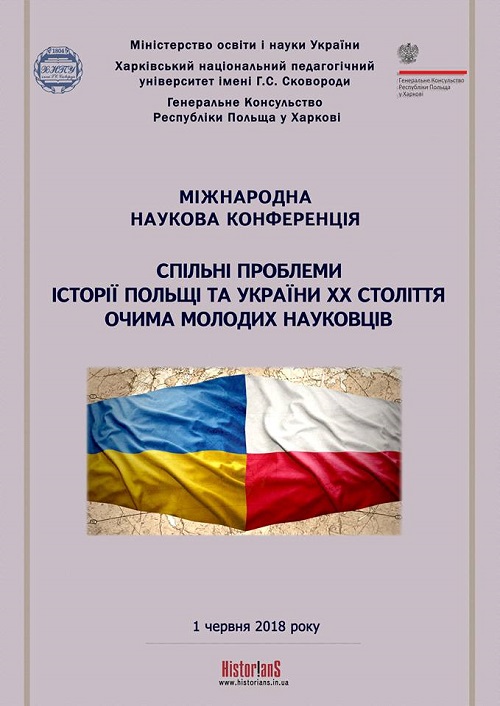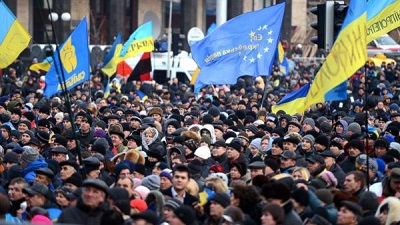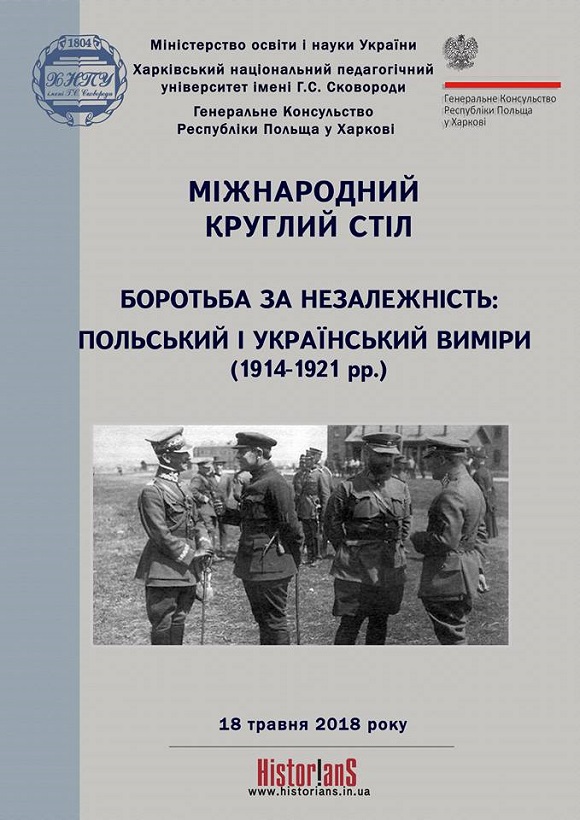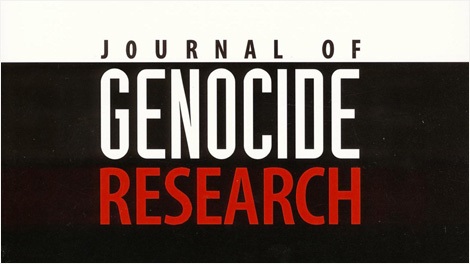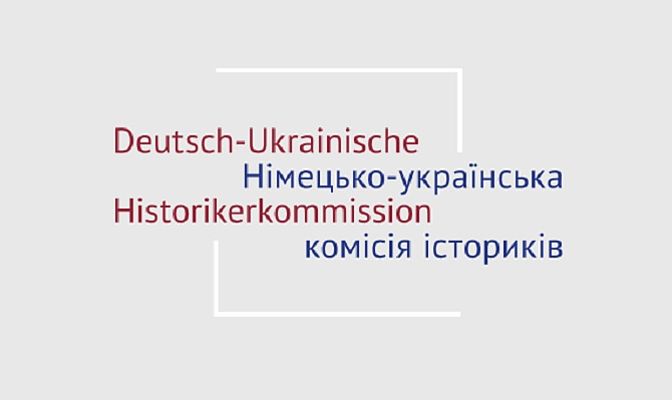Оголошення
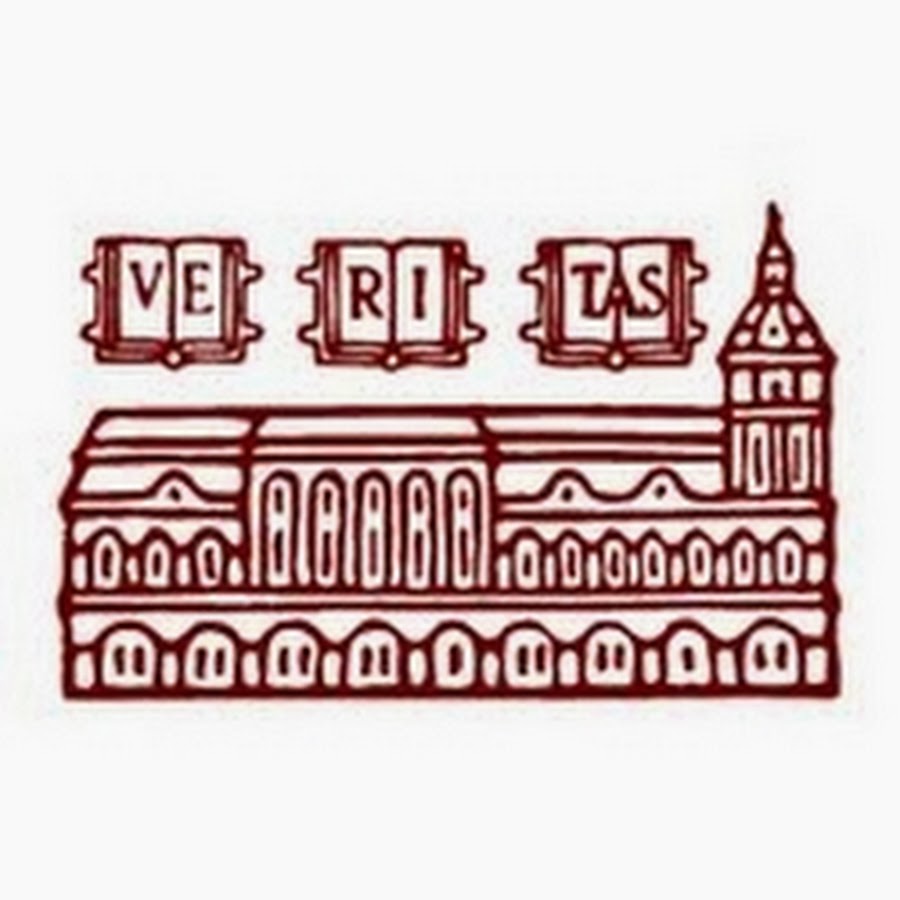
Нові дослідження з історії Голодомору в проекті Українського наукового інституту Гарвардського університету "МАПА" (Цифровий історичний атлас України):
http://huri.harvard.edu/news/news-from-huri/345-holodomor-new-insights-in-ukr.html
http://huri.harvard.edu/news/news-from-huri/344-newly-mapped-data-leads-to-new-insights.html
Volume for the Routledge Series in Conspiracy Theories
Edited by
Anastasiya Astapova (University of Tartu)
Onoriu Colacel (Stefan cel Mare University of Suceava)
Corneliu Pintilescu (The Romanian Academy Cluj-Napoca)
Tamás Scheibner (Eötvös Loránd University of Budapest)
In this volume, we explore new democracies that emerged after communism in Eastern Europe in the early 1990s. The expectation then was that countries of the region regain their agency and join capitalist states in a pan-European and worldwide circulation of capital, people, and ideas. This was dominantly imagined as a process leading to greater democracy and freedom, including freedom of speech and a more sophisticated public discourse capable to feed politics with refined ideas. Twenty years after the regime changes, however, Eastern Europe emerged instead as a primary place for inventing, adapting, mediating, and redistributing conspiracy theories.
This volume has three principal objectives: (1) it explores the various manifestations of the most viral conspiracy theories in contemporary Eastern Europe, (2) it seek answers to the question what are the historical conditions of the popularity of conspiracy theories in the region and, with a particular focus on how Cold War media (on both sides of the Iron Curtain) was managed and what imprint it had on regional practices and mindset, and (3) what are the historical-cultural specificities in these countries on the longue durée that contributed to the emergence of such a great variety of conspiracy theories. To answer these questions, we concentrate on the case studies from East European states exemplary of the interplay of the Communist influence, local dynamics, and global processes in the formation of conspiracy theories in this region.
Please send your suggestions, the abstract of your potential contribution, or questions about the volume to anastasiya.ast@gmail.com.
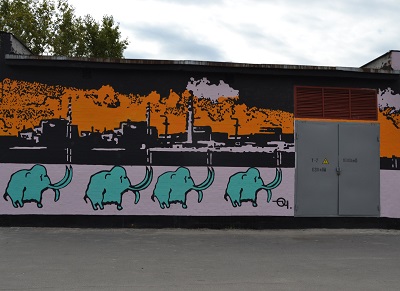
Національний університет "Києво-Могилянська академія" та Гердер інститут (м. Марбург, Німеччина) запрошують до участі у Літній школі "Полісся як ландшафт втручання", яка відбудеться 11-21 вересня 2018 р.
Літня школа зосереджена на проблемах державних інтервенцій в українській та білоруській частинах Полісся протягом ХХ століття та підійматиме теми балансу політики та ідентичностей, технологій та екології.
Зареєструватися до участі, а також отримати додаткову інформацію можна за посиланням

CALL FOR PAPERS: DEADLINE Monday 16 July 2018
War, Art and Visual Culture
An International Symposium on the Art and Visual Culture of War, Conflict and Political Violence
Monday 25 February 2019 SH Ervin Gallery
Sydney, Australia
CONFIRMED KEYNOTES:
Prof Joanna Bourke
Professor of History, Birkbeck, London and editor of War and Art: A Visual History of Modern Conflict (2017)
Dr George Gittoes AM Sydney Peace Prize 2015,
Bassel Shehadeh Award for Social Justice USA 2013
Today’s images of war and violent conflict are unlike those of the past – and the stakes are particularly high. News images of attacks on major European cities are immediate and their presentation emotive, videos of ISIS beheadings or military strikes spark across the internet in seconds, and contemporary war artists reflect on these images, sometimes offering alternative perspectives on war and violence. Artists and photojournalists are often embedded with troops, while others risk everything to work independently. Some voices dominate, while others are excluded. In recent years, then, the art and visual culture surrounding conflict is diverse and politically complex. War, Art and Visual Culture is a symposium aimed at exploring these complexities and generating new knowledge in this growing field.
The War, Art and Visual Culture symposium invites proposal submissions from artists, theorists, historians and researchers of war, art and visual culture.
We invite abstract submissions for individual 20-minute papers, as well as proposals for panel discussions, and other modes of presentation. We also invite graduate researchers, and particularly encourage interdisciplinary, cross-cultural and international submissions.
Possible topics include, but are not limited to:
- The conflicts and compromises of embedding artists, journalists and photographers with troops
- Historical perspectives on war, art and visual culture in comparison with today
- The ethics and aesthetics of aftermath photography and moving images
- The exclusion of other voices from the art and visual culture of war
- Uncovering the violence of image archives
- The politics of aesthetics in images of war and violence
- Differences in the approaches and work of official and non-official war artists
- The still and moving digital image in contemporary warfare
- Populism and nationalism in the art and visual culture of war and conflict
For papers and panel proposals, please submit an abstract of no more than 350 words, as well as a brief CV and 100-word biography (for each participant). Deadline for submission is Monday 16 July 2018.
Please direct submissions and questions to A/Prof Kit Messham-Muir at kit.messham-muir@curtin.edu.au Accepted participants will be notified in August 2018.
The War, Art and Visual Culture symposium is presented as part of the Art in Conflict project by Curtin University, University of Melbourne, UNSW Art & Design and University of Manchester, in partnership with the Australian War Memorial and the SH Ervin Gallery (National Trust NSW), with the generous support of the Australian Research Council.
Assoc Prof Kit Messham-Muir
Lead Investigator, Art in Conflict project School of Media, Creative Arts and Social Inquiry GPO Box U1987
Perth Western Australia 6845
Australia
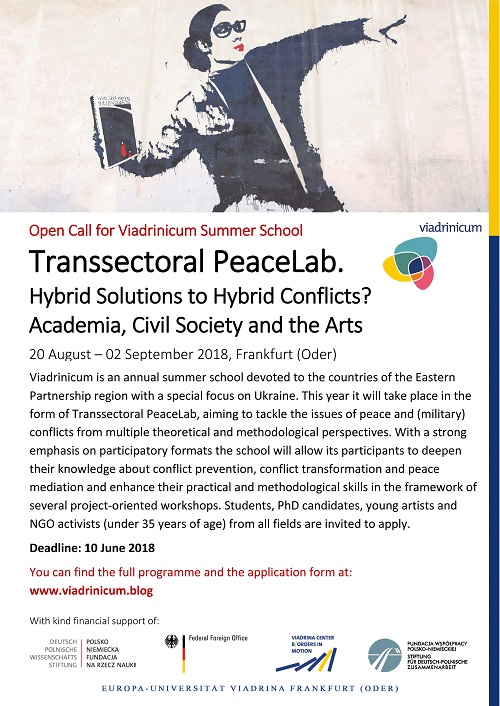
Call for Applications
Viadrinicum is an annual summer school devoted to the countries of the Eastern Partnership region with a special focus on Ukraine. This year it will take place in the form of Transsectoral PeaceLab, aiming to tackle the issues of peace and (military) conflicts from multiple theoretical and methodological perspectives. With a strong emphasis on participatory formats the school will allow its participants to deepen their knowledge about conflict prevention, conflict transformation and peace mediation and enhance their practical and methodological skills in the framework of several project-oriented workshops.
The school seminars will be devoted to theoretical and empirical analysis of the role of memory and identity discourse in the conflicts areas of the Eastern Partnership region. Among others, the program includes the following seminars and workshops:
• Tatiana Zhurzhenko (Vienna), Memory Wars Before and After "Ukraine Crisis"
• Andrii Portnov (Frankfurt/Oder), Understanding Violence and War
• Lars Kirchhoff (Frankfurt/Oder), Anne Kraus (Frankfurt/Oder), Multitrack Conflict Management and Peace Mediation Method(s)
• Vesna Hart (Harrisonburg, VA), Restoring the Social Fabric: Bridging Memories and Narratives
• Marta Havryshko (L‘viv), Gender and War: Women in the Ukrainian Military during the War in Donbas
Besides the academic part, participants of the school will also be able to develop their own small (team) projects in the framework of three workshops (Art.Lab, Doc.Lab, Media.Lab) under the close guidance of professional experts.
Furthermore, there will be film screenings, public discussions, and Open Space
sessions where participants will have a chance to discuss their own scientific or
cultural projects with other participants and scholars.
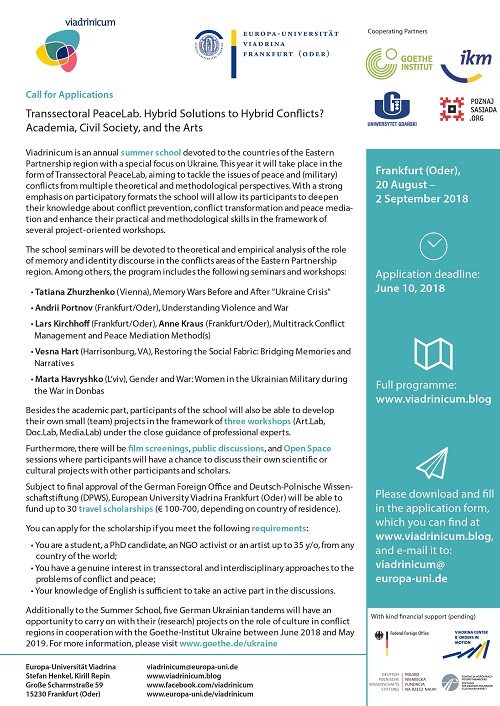
Subject to final approval of the German Foreign Offce and Deutsch-Polnische Wissenschaftstiftung (DPWS), European University Viadrina Frankfurt (Oder) will be able to fund up to 30 travel scholarships (€ 100-700, depending on country of residence).
You can apply for the scholarship if you meet the following requirements:
• You are a student, a PhD candidate, an NGO activist or an artist up to 35 y/o, from any country of the world;
• You have a genuine interest in transsectoral and interdisciplinary approaches to the problems of conflict and peace;
• Your knowledge of English is suffcient to take an active part in the discussions.
Additionally to the Summer School, five German Ukrainian tandems will have an opportunity to carry on with their (research) projects on the role of culture in conflict regions in cooperation with the Goethe-Institut Ukraine between June 2018 and May 2019. For more information, please visit www.goethe.de/ukraine
Download Call for Applications >>
Download Plakat Viadrinicum >>

IN BETWEEN? OPEN CALL FOR APPLICATIONS
European Network Remembrance and Solidarity is launching a recruitment process for an ongoing educational project called In Between?, which aims to encourage the young generation of Europeans to explore 20th-century history by speaking with those who lived it. Participants are given a unique opportunity to gain theoretical and practical experience in documenting oral stories.
This time, participants will travel to Rijeka in Croatia and to Slovak-Czech borderland. The call for applications closes on 7 May 2018.
The call is open to all candidates age 18-25, including students and freelancers representing various areas of interest that may include history, cultural anthropology, sociology and audiovisual arts, among others. After being selected, they will take part in interdisciplinary workshops on 9-12 July and study visits on 13-19 July 2018.
After 4-day workshops in Warsaw participants will have learned the theoretical basics of interview methodology, digital video-camera operation, photography, digitalisation of visual materials, archiving and historical context. Then, they will be divided into groups of six to travel to border towns and other localities for seven days. During their stay they will conduct and document interviews with local inhabitants. Recollections, sound and video recordings, photographs, letters as well as scanned documents and other items reflecting the daily life of the communities will constitute a basis for building accounts of their travel that will be shared with historical institutions and local archives.
Factors to be considered in the recruitment process include a candidate's motivation to participate in the project, openness and readiness to cooperate. Knowledge of English and one of the languages spoken in a selected region is a must.
To obtain the application form, The Rules Governing the Recruitment of Participants and any further information please visit: www.enrs.eu/inbetween or contact Ms Karolina Dziełak, In Between? Project Coordinator (e-mail: karolina.dzielak@enrs.eu and telephone: 0048 22 395 7610).
European Network Remembrance and Solidarity (ENRS) is an international initiative focusing on research, documentation and dissemination of knowledge of Europe's 20th-century history and ways that it is commemorated with special focus on periods of dictatorships, war, and public opposition to captivity.


